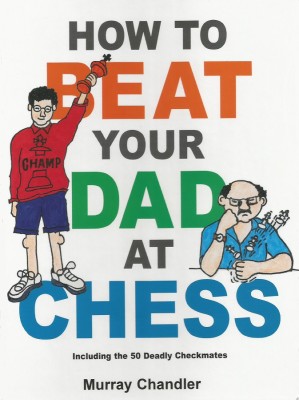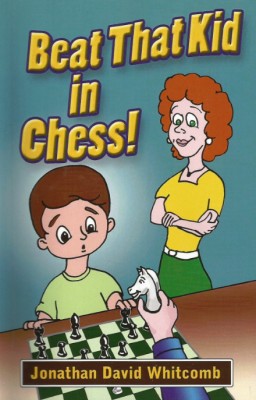This is a double book review:
- How to Beat Your Dad at Chess (by Chandler) – best for intermediate players
- Beat That Kid in Chess (by Whitcomb) – best for “raw” beginners
The first is not really about defeating your father; the second is not really about defeating a kid. Both are exceptional at teaching you to win a chess game, but only within narrow limits: two different skill levels in chess.
How to Beat Your Dad at Chess
This chess book is extremely popular on Amazon, yet combining the two-star and one-star customer reviews makes 9%, which can be a warning flag if you’re to purchase a book to be used as a gift (6% are two-stars; 3% are one-star). How to Beat Your Dad at Chess is far from ideal for the early beginner who has not yet learned to look ahead in calculating a combination in his or her head. One purchaser said:
This was Not the book I needed to help my 9-yr old grandson advance from the beginning level of chess playing. It is much too complex. . . .
That grandparent would probably have been much happier at purchasing Beat That Kid in Chess, which is crafted especially for early beginners. So who does benefit from the book for intermediate players?

How to Beat Your Dad at Chess, by Murray Chandler, can greatly benefit certain players who have already learned how to look ahead at least to this degree:
- What move can I make in this position on the board? (find a move to make)
- What can my opponent do in response to that move?
- What can I then do in response to that potential move by my opponent?
Once a post-beginner has arrived at that level of move-calculating ability—that’s when How to Beat Your Dad at Chess may be appropriate. But don’t throw that book at a novice who is not ready, or it may bounce back at you.
So what exactly does the book by Chandler teach a post-beginner? It’s almost entirely devoted to checkmate combinations. That’s it. If that’s what a chess player needs the most, then How to Beat Your Dad at Chess may be ideal, the very best chess book.
But if you want something that teaches you about openings or middle games or endgames, you’d better look for another chess book.
Beat That Kid in Chess
If you win most of the chess games you play, at least some of the lessons in this chess book may be too elementary for you. It’s for the raw beginner who knows the rules of the game but has not yet learned much about winning.

The first chapter demonstrates how to recognize an opportunity to checkmate your opponent. Just as important, it shows you how to recognize when a checkmate is almost possible but not yet available in a position on the board. (Many other books do the former but not the latter.)
The reader may be unaware of the new NIP system of chess training in Beat That Kid in Chess, while reading and looking at the diagrams. You don’t need to know anything about the teaching-psychology of nearly-identical positions to benefit from it. You learn to think tactically in a smooth orderly manner, naturally learning to think a little bit more like a master would think about a particular chess position on the board.
This new chess book may be the first publication to use the NIP system systematically, helping the early beginner to see what’s most important. In addition, the following important subjects are taught:
- Checkmate
- Material – both preservation and capturing
- Defending against checkmate in the opening
- “Tactics in Battle” (Chapter Four)
- The order of what to look for in a position
- Endgame
- Middle Game
- Opening
This chess book ends with two short sections of exercises: simple and “advanced”
###
.
Like the other two chess books, it has a title and cover image that could be misleading. . . . [The other book, “Beat That Kid in Chess,” is much better for the early beginner]
“Take the lessons in this book [‘Beat That Kid in Chess’] seriously and your ability to play chess may advance further than if you had struggled through losing twenty games.”
Tactics in a Chess Combination
The Cuban chess wizard Jose Capablanca played a gorgeous combination against the music professor Marc Fonaroff, apparently at an evening party in New York [in 1918].
.



Pingback: Buying a Chess Book for a Gift | Child Care For Lakewood Blog
Pingback: book review - Beat That Kid in Chess | Chess Book Reviews